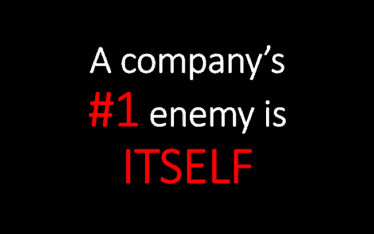The wisdom of learning from failure is incontrovertible
How to make organizational change programs succeed
According to a Towers Watson survey, only 25% of change initiatives succeed over the long term. It’s a baffling number since these moves range from mergers to reorganizations to business pivots. The stakes are high every time.
The wisdom of learning from failure is incontrovertible. Yet organizations that do organizational change well are extraordinarily rare.
Based on the article “Why do so many organizational change efforts fail” there have been a lot of discussion in various LinkedIn groups. The many responses included rich and varied perspectives and opinions on change management and organizational culture.
Below several distinctive views, illustrated by direct quotes from the LinkedIn discussion threads – unfortunately it was not possible to acknowledge everyone who made helpful contribution.
Alanea Kowalski
Good post. All of these reasons are very true and the worst case is when you see them all at once! In my experience #2 is the toughest to overcome as you are dealing with Executive Egos …. I see this issue quite a bit in my Leadership Coaching. Once Execs understand that asking for input/opinions/help as needed is not a sign of weakness … rather a sign of strength and maturity things move forward in a more inclusive and positive approach to change.
Lois Krause
Unfortunately, most leaders think that the culture is what they say it is on their website, and do not see the real culture being practiced. Beginning with the wrong assumptions can never have a positive outcome! Then add the resistance, and the whole change management plan goes down in flames! After that happens, then they usually turn to HR and say – “Fix it!”. If only they had consulted them in the first place, they may have had a chance!
Danielle Barrette-Marcuccio
I would agree with the last two points, namely culture and resistance. Culture is a significant hurdle particularly if the organizational shift represents a significantly different direction that what is ingrained with “the way things are done around here”which then creates lots of resistance – it takes time, engagement and tactics that allow employees to move forward
Dr. Alyssa Streller
I honestly think #3 is the biggest pitfall. Organizations try to change without changing their culture, making them inauthentic.
Dawn Dome
Yes, #2 & #3 I’ve seen so often, unfortunately.
Marissa Beytell
Very good article. I firmly believe that one of the greatest pitfalls is that all employees are not involved and that management makes changes that will influence employees, and without the employees input, changes are doomed to fail. I totally agree with your article. Thank you for sharing.
Mariella Gatt
The bottom line to all these items is leadership – do leaders have the patience, strategic mindset, people skills and energy to nurture and support all the steps that lead to the desired change?
Helen LIM
How true and valid even for organizations in Asia. Walk the talk, coming from the heart, authenticity …. people from the ground look for all these signs, to stay with the movement, one step at a time.
Nadeem Iqbal
Top down should be monitoring lens but the impetus will be gained through involvement, facilitation and rewarding performance. Great Article.
Stephen McCall
Many organizational change programs fail because managers fail to get everyone on board. In order for change to succeed, firstly, managers must believe in the change the organization is trying to make, if they do not believe in the change but pretend to do so, employees can see through this. Managers must find out what is causing resistance to change, which can be for a number of reasons including fear of the unknown or lack of information. Change must be communicated well to everyone affected, otherwise there will always be resistance, which will lead to failure.
Michael Smith
Nice article Rick. I especially agree with #3. Often leadership does not fully understand or are disengaged from the current organizational climate and culture. This dooms any initiative from the start.
Dean Glass
Nice article Torben Rick. I especially like reason #4 of why change fails, “….Change happens at the bottom…”, as in my opinion, increasingly, change is very agile, and as such needs to be treated as emergent change where approach of “nudging” towards the ultimate goal seems to be a very effective way of ensuring everyone arrives at the end destination of the “change journey”.
There is so much around this subject that it really needs a mindset change of C-level stakeholders to appreciate the right approach for their specific culture, as for a machine-type organization traditional methods may work very well – but for most organizations this does not seem to be the optimal approach.
Adrian Mapp
Change fundamentally always comes down to managing egos. Senior Management ego “I’m the only one who has control” or Middle management “Its better for my career if I come up with all the ideas”and employees with a self entitlement complex. When you identify and manipulate these charters, you find they will be more inclined to manage the long-term controls for success.
Ian Pilkington Adrian
I agree with your comments, which is why “change management” should be undertaken in the context of shared direction and goals. The most important ego to be hidden is the senior manager, who should really facilitate the change process, and enable clear process and communications throughout.
Jaime Garcia
Agree with #6. Change is a journey and not a destination. Unfortunately many organizations expect to see change from Change delivery day +1 and if that hasn’t happened then the change was a failure. Set targets/benefits that the change is to achieve manage the project or activities to get them done.
Daniel Berners
I think this quote from the video says it all: “Change management is a dolphin, not a whale“. Thanks for sharing, Torben!
Short URL & title:
Make organizational change programs succeed — https://www.torbenrick.eu/t/r/aje
Share it:
If you enjoyed this article, please take 5 seconds to share it on your social network. Thanks!








About The Author
Torben Rick
Experienced senior executive, both at a strategic and operational level, with strong track record in developing, driving and managing business improvement, development and change management. International experience from management positions in Denmark, Germany, Switzerland and United Kingdom